Veranstaltungen und Aktivitäten
From New Normal to New Work? Insights from Japan and Germany
 DIJ Web-Forum
DIJ Web-Forum
Due to the corona pandemic, work organization has been subject to dramatic change, and teleworking from home offices had to be suddenly implemented to keep businesses running. Mobile working, software-based collaboration, web-based meetings and new means of performance control were installed at a large scale. Have we suddenly reached the long-discussed digital future of work? Or is this only a temporary phase, and work life will return to what it was before the pandemic? Our speakers will outline the major changes in the organization of work caused by the pandemic in Japan and Germany. They will also discuss to what extent national regulations have been obstructing, shaping or supporting respective adjustments and assess to what extent the newly introduced workstyles can be expected to last. Details
Speakers:
Andrea Hammermann, German Economic Institute
Nobuko Nagase, Ochanomizu University
Michael Johannes Pils, Taylor Wessing
Chisako Takaya, Mori Hamada & Matsumoto
moderated by Franz Waldenberger, DIJ
Symposium ‚Global Views of Japanese Parliamentarism‘
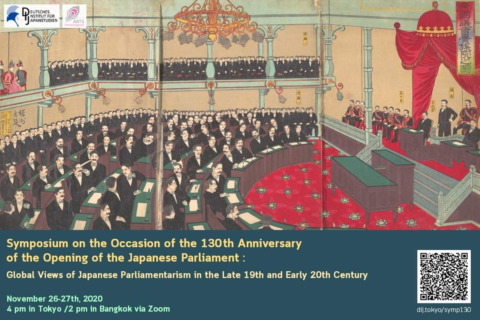 Online Symposium (26-27 November 2020)
Online Symposium (26-27 November 2020)
On November 29, 1890, the parliament of the Empire of Japan, the Imperial Diet, met for the first time marking the beginning of parliamentary government not only in Japan but also in Asia. While the recognition of Japan as a role model for successful ‘modernization’ of a non-Western society in the wake of the Russo-Japanese War has received much scholarly attention, the transnational appeal of this successful establishment of representative governance in Japan has not yet received much interest. Together with the Faculty of Arts, Chulalongkorn University, Bangkok, the DIJ will take the occasion of this year’s 130th anniversary of the opening of the Imperial Japanese Diet as an opportunity to hold a symposium to discuss the global appeal of this first functioning constitutional government in Asia and beyond. For the programme and registration information see our event page.
DIJ researchers at VSJF Sections‘ Meetings
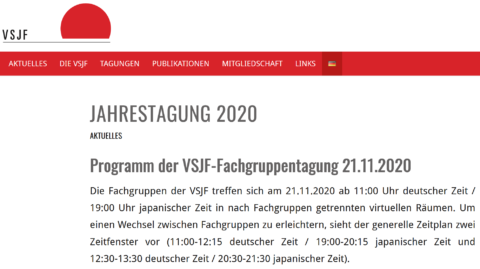
Several DIJ researchers and alums will participate in this year’s sections‘ meetings of the German Association for Social Science Research on Japan (VSJF). The sections‘ meetings replace the annual conference which has been postponed to 2021 due to the Corona pandemic. Research fellow Nora Kottmann and DIJ alum Carola Hommerich are organizers of the Sociology Section (with Celia Spoden). The History Section is convened by VSJF president Anke Scherer and research fellow Torsten Weber. The Technology Section is convened by DIJ alum Cosima Wagner and research fellow Susanne Brucksch who will also give a paper („Trend report: Digital health developments in Japan during the pandemic“) in that section. Former DIJ research fellow Harald Conrad organizes the Economy Section. The sections meet online on Saturday, 21 November, from 19.00-20.15 and 20.30-21.30 (JST). During the VSJF members‘ meeting, the Contemporary Japan Best Paper Award 2020 will be presented by CJ’s Managing Editor Isaac Gagné. For the programme of all sections‘ meetings see the VSJF website.
Sonja Ganseforth quoted in news reports on anti-Olympic protests

Comments by social scientist Sonja Ganseforth on recent anti-Olympic protests in Tokyo have appeared in international media. „Once the decision to hold the Olympics in Tokyo had been made, many (Japanese) also considered it anti-social or even unpatriotic to protest openly against the Games“, Sonja is quoted in the AP news article Critics speak out on Tokyo Olympic costs, pandemic, fairness published on 13 November. A version of the article also appeared in the Japan Times on 17 November. On 22 November, an interview with Sonja appeared in the German daily newspaper taz. In „Eine Absage ist möglich“, she explains the role of anti-Olympic activism in Japanese society. Sonja has been researching anti-Olympic movements in Japan as part of the DIJ special project on the Tokyo Olympics and its book publication Japan through the lens of the Tokyo Olympics. Her chapter „The difference between zero and one“ is available for free download, alongside all other chapters in this open access book.
Sonja Ganseforth’s research at Coastal Transitions conference
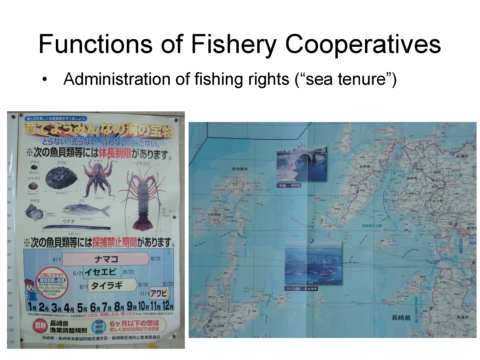 On November 6, human geographer Sonja Ganseforth presented her latest research on the implications of the Japanese Fishery Law reform for small-scale coastal fisheries at the „Coastal Transitions: Blue Economy“ 2020 conference. Based on qualitative field research in rural Japan, Sonja’s paper „Blue Growth or Decline in Japanese Coastal Fisheries“ analyzed how global discourses of sustainable growth and institutional reform in the Japanese fishing sector are driving the enclosure of one of the last vestiges of natural resource commons. The focus on private capital and presuppositions of economic and scientific rationality drives the commodification and enclosure of this contracting commons – a process supported by domestic political circles as well as through international agenda setting campaigns. Sonja’s presentation is part of her ongoing research project on Fishing communities between growth and demise in Japan. The online conference „Coastal Transitions: Blue Economy“ was jointly organized by Liverpool John Moores University, Southern Connecticut State University and MIC University of Limerick.
On November 6, human geographer Sonja Ganseforth presented her latest research on the implications of the Japanese Fishery Law reform for small-scale coastal fisheries at the „Coastal Transitions: Blue Economy“ 2020 conference. Based on qualitative field research in rural Japan, Sonja’s paper „Blue Growth or Decline in Japanese Coastal Fisheries“ analyzed how global discourses of sustainable growth and institutional reform in the Japanese fishing sector are driving the enclosure of one of the last vestiges of natural resource commons. The focus on private capital and presuppositions of economic and scientific rationality drives the commodification and enclosure of this contracting commons – a process supported by domestic political circles as well as through international agenda setting campaigns. Sonja’s presentation is part of her ongoing research project on Fishing communities between growth and demise in Japan. The online conference „Coastal Transitions: Blue Economy“ was jointly organized by Liverpool John Moores University, Southern Connecticut State University and MIC University of Limerick.
Japans neuer Botschafter in Deutschland besucht das DIJ
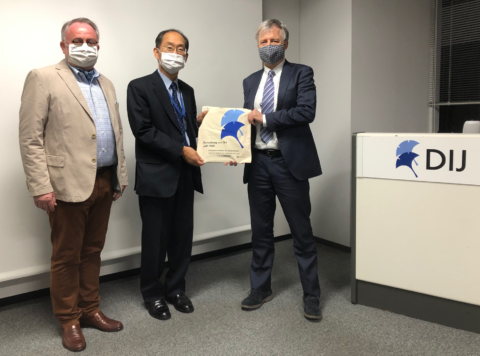
Der neue Botschafter Japans in der Bundesrepublik Deutschland, Hidenao Yanagi, besuchte am 4. November unser Institut. Direktor Franz Waldenberger und Verwaltungsleiter Joachim Röhr informierten Botschafter Yanagi über die laufende Forschung am DIJ sowie das internationale Netzwerk der Max Weber Stiftung. In perfektem Deutsch berichtete Herr Yanagi, dass er sich auf sein zweites Posting in Berlin sehr freue, auch um sein Verständnis und seine Verbindung zu den neuen Bundesländern noch zu vertiefen. Außerdem freue er sich auf die anstehenden Fest-Veranstaltungen zum 160jährigen Bestehen der Beziehungen zwischen Japan und Deutschland im kommenden Jahr, auch wenn wegen der andauernden Pandemie möglicherweise nicht alle realisiert werden könnten.
Herr Yanagi lobte im Gespräch die bedeutende Rolle, die das DIJ in den vergangenen 30 Jahren für den Ausbau der deutsch-japanischen Beziehungen gespielt habe. Von 2014 bis 2017 war Herr Yanagi Generalkonsul in München, anschließend knapp drei Jahre Botschafter in Jordanien. Es freut und ehrt uns sehr, dass sich der Botschafter wenige Tage vor seiner Abreise nach Berlin die Zeit nahm, unser Institut zu besuchen.
Issue 32(2) of Contemporary Japan published
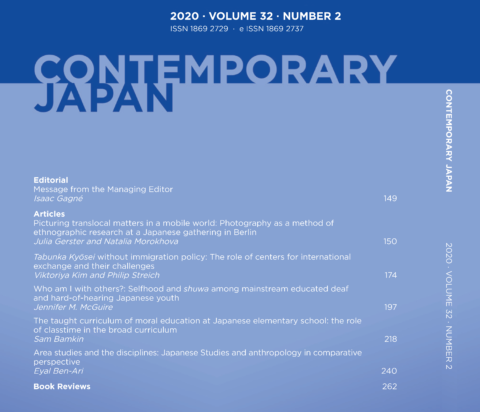
The latest issue of Contemporary Japan is now available online and in print. CJ32(2) features a range of articles exploring: photography and ethnographic research among Japanese in Berlin (Julia Gerster & Natalia Morokhova); the role of centers for international exchange in multicultural community building (Viktoriya Kim & Philip Streich); notions of selfhood among deaf and hard-of-hearing youth (Jennifer M. McGuire); and moral education in elementary school classrooms (Sam Bamkin). This issue also features an Invited Commentary by Eyal Ben-Ari reflecting on the relationship between area studies and the disciplines and the adaptive potential of Japanese Studies. Plus: five reviews of recently published books on the self-defense forces, food safety, gardening, memory in Hiroshima, and economic history. Please see the full issue here
DIJ researchers in German and Japanese media
Deputy director and sociologist Barbara Holthus is quoted in the current issue of the German weekly newspaper Die Zeit (46/2020). In the article „Zurücktreten, bitte“, Barbara criticizes the restrictions imposed by the Japanese government on foreigners seeking to re-enter Japan during the Corona pandemic.
Historian Torsten Weber is quoted in the German weekly magazine Der Spiegel (45/2020). In „Globaler Kampf“, Torsten comments on nationalist elements in exhibitions promoting the Tokyo Olympics and Japan’s Olympic history. His remarks draw on research he has done for the DIJ’s special project on the Tokyo Olympics.
In the context of recent discussions about politics and academic freedom in Japan, historian of science Harald Kümmerle is quoted in a Kyodo article that was printed in several Japanese daily newspapers, including the Chūgoku Shimbun (1 November 2020). Giving the example of Albert Einstein’s expulsion from the German National Academy of Natural Sciences Leopoldina in 1933, Harald explains the treatment of Jewish scientists in Nazi Germany.








 Open Access
Open Access 
